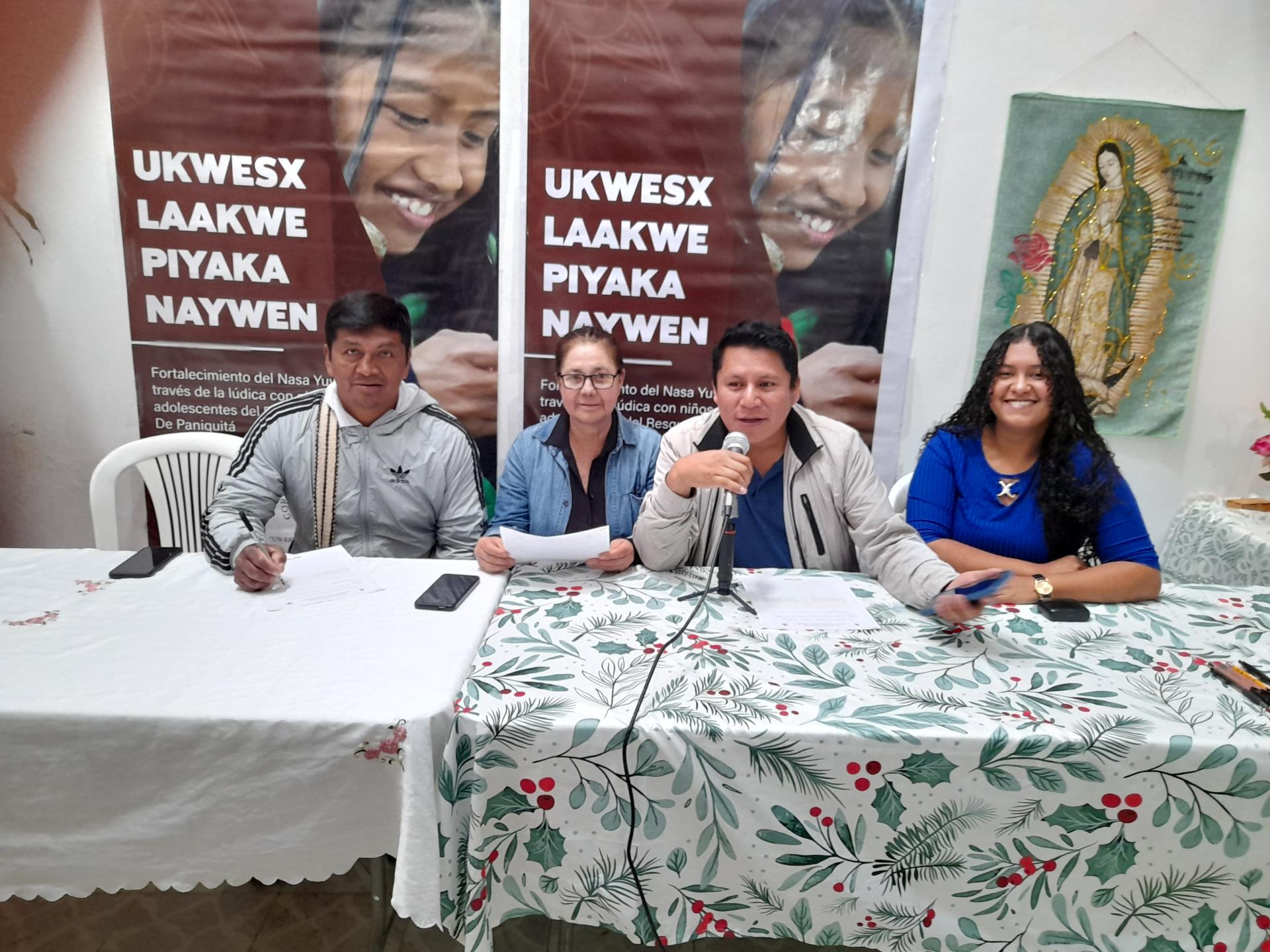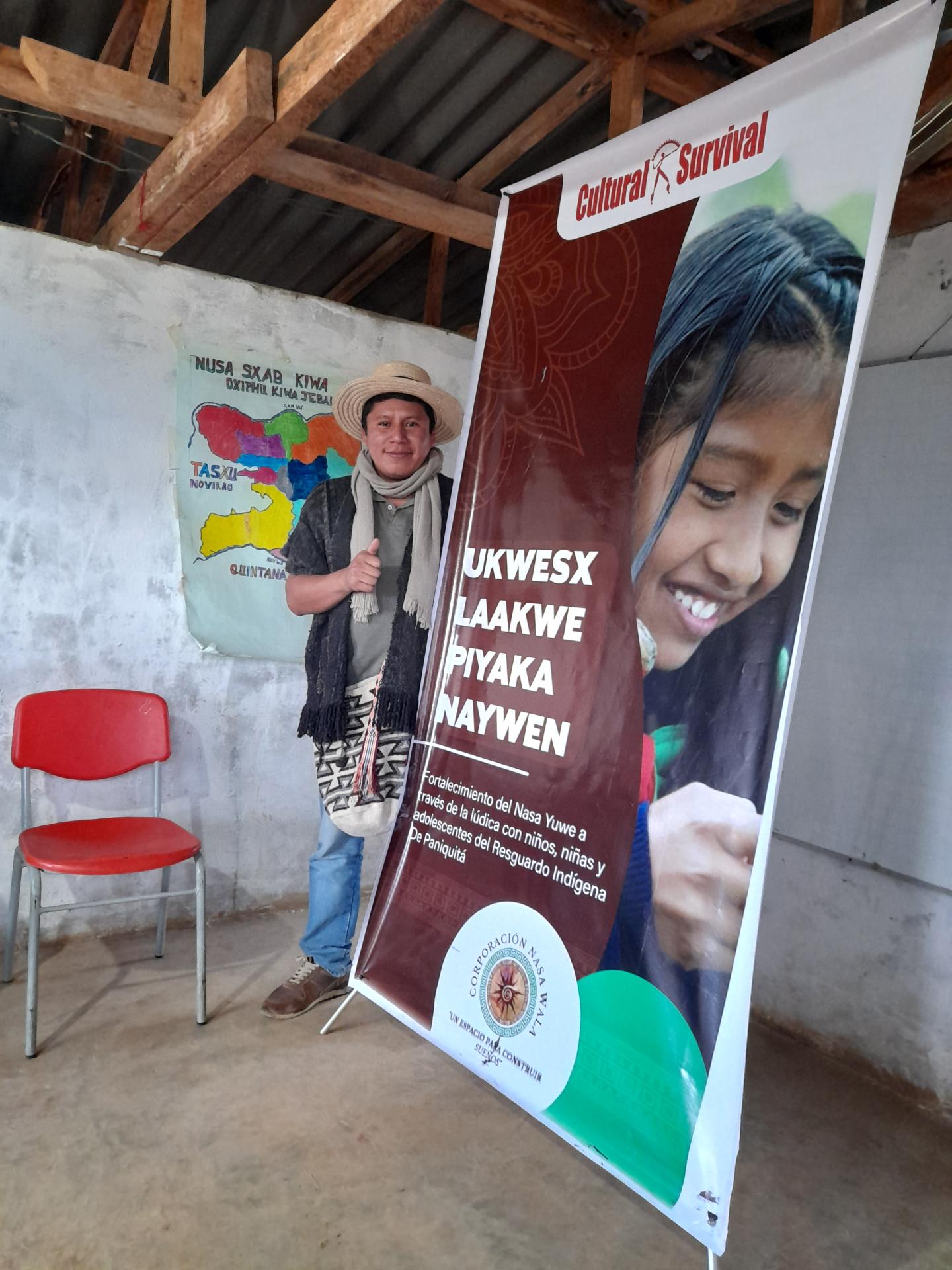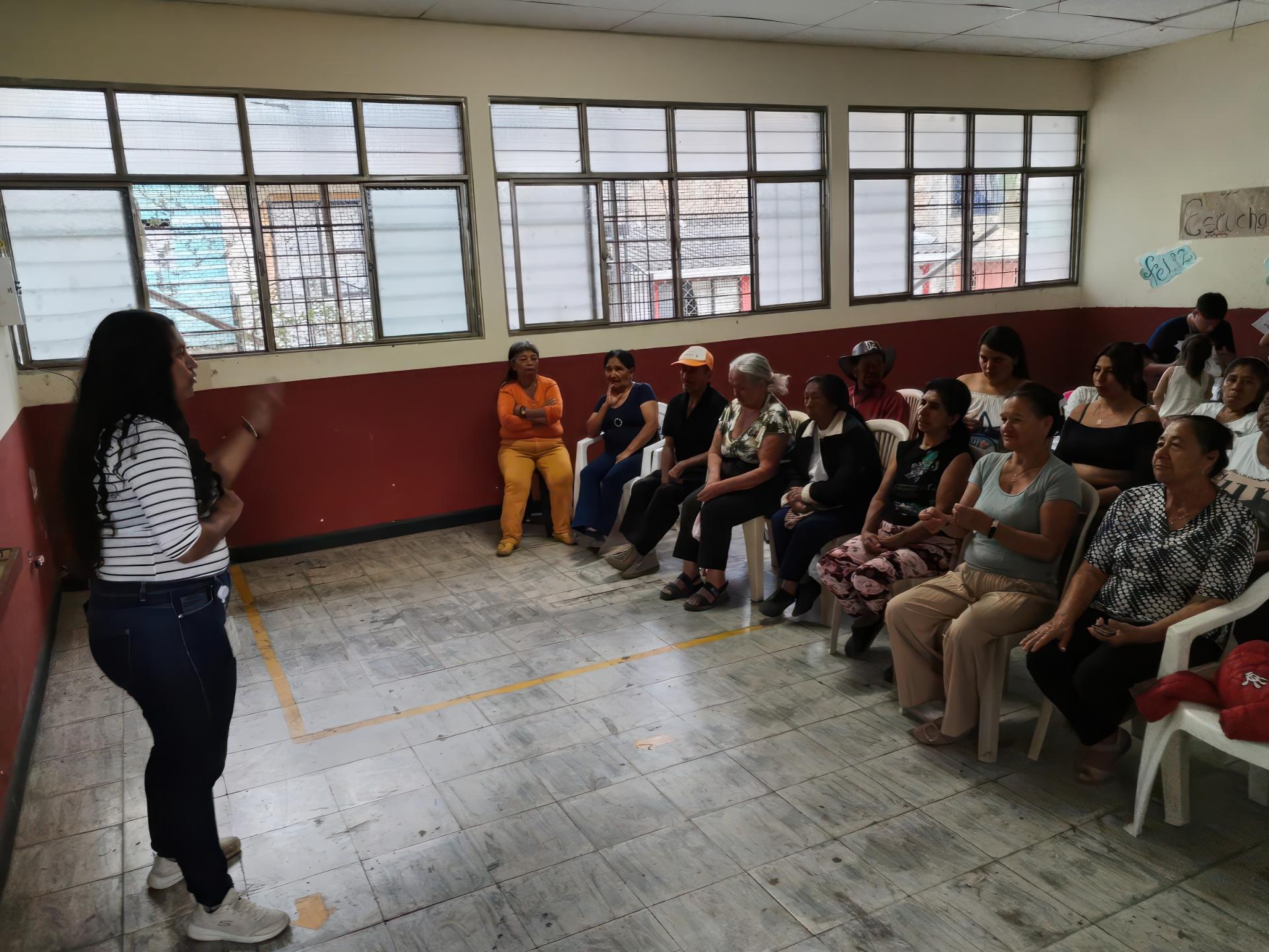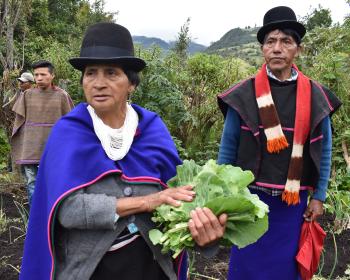
Catalina Vergara Realpe (Nasa) hails from the southwestern part of Colombia. Although her roots are tied to the territory of the Nasa People of Valle del Cauca, department of Cauca, she spent most of her childhood in Ecuador. Her experiences growing up opened her eyes to the diversity of cultures and their relationship to landscapes, which deepened her appreciation for nature and its inextricable connection to human existence. This realization motivated her to return to the ancestral lands of her people, and she eventually settled in the Indigenous Reserve of Paniquitá in the department of Cauca.
Witnessing how the Earth generously provides for the livelihood of her Peoples, Vergara became passionate about recovering the cultural identity of Nasa Peoples and improving their quality of life by providing alternative ways to reconnect to the land. She became deeply rooted to the lands and water systems, which guided her to see the importance of passing down Traditional Knowledge to younger generations. “This connection prompted me to pass on all that I have learned and experienced to the people around me. My inclination is particularly focused on the youth, as I consider them to be the seed of the future. My passion lies in fighting tirelessly for their rights, especially in the field of education, where I work hard to help young people access college opportunities through various scholarships,” she says.
In 2023, Vergara was awarded a Cultural Survival Indigenous Youth Fellowship to strengthen the capacity and leadership of Indigenous youth. Her fellowship project, “Ukwesx Laakwe Piyaka Naywe” (Strengthening the Nasa Yuwe Through Play), focused on play-oriented activities for children and youth to strengthen their cultural identity and deepen their connection to the Nasa Yuwe language. Linguistic and cultural diversity is one of the most precious heritages of humanity. In every corner of the world, languages are the vehicle of traditions, knowledge, and life ways that have been forged over generations. Indigenous languages play an essential role, as they embody an integral part of the identity and cultural practices of Indigenous communities, interconnected with the fabric of landscapes, waterways, and ecosystems.
Vergara and her team conducted investigative research on the Nasa Yuwe language in her homeland of Paniquitá. The team covered an area of more than 80 square kilometers, encompassing 11 villages: Buenavista, La Estela, Campo Alegre, El Diviso, Palace, Hato Viejo, San Antonio, La Palma, Paniquitá Centro, La Primavera, and La Rivera. The study was conducted with the active participation of the Elders of the community to understand the distribution and linguistic competence in the region and how to incorporate it into educational systems.

Development of preliminary guidance as part of fellowship project.
The research revealed valuable data on the Nasa Yuwe language, where differentiations of speakers were identified between villages. For example, the team identified a variance of the spoken form of Nasa Yuwe in Paniquitá from the other villages, where the language was identified as Naywen. This variant is different in its pronunciation, grammar, vocabulary, and in every aspect of the daily life of its speakers. Such a finding exemplifies the importance of linguistic diversity in the Paniquitá reserve. The study also paved the way for local community members to understand the benefits of strengthening and promoting the Nasa Yuwe language, as well as the implementation of effective strategies in schools and the promotion of community initiatives to strengthen the cultural identity of the Nasa Peoples. Another finding from the research was a decrease in the number of Nasa Yuwe speakers, which highlighted the need for action to preserve the language. Projects such as Vergara’s, which focus on implementing strategies to strengthen the language among children and adolescents in Indigenous communities, are essential to counteract the loss of the language and ensure its transmission to future generations.
The research study was also an important step in the ongoing commitment to ensuring the transmission of Traditional Knowledge and that cultural practices are passed down to the following generations, building a sense of belonging for the youth. “With every word that is spoken, with every story that is told, the Nasa Yuwe language lives on, linking our community to its past, its present, and its future,” Vergara says. “Language is the main tool for communication and the transmission of knowledge and experiences. Strengthening this language can help foster effective communication among people in the community, which can improve interpersonal relationships and reduce social conflicts. The teaching of the Nasa Yuwe language can have a positive impact on the education of Indigenous children and youth, as it allows them to better understand the concepts and values of their culture and environment.”

Event with Elders, Indigenous leader speaking as part of the fellowship project.
Through her fellowship project, Vergara collaborated with three mixed rural schools located in the center of the Paniquitá Reserve to incorporate culturally appropriate methodology and Nasa Yuwe language material into the curriculum to strengthen the connection among children and youth to their cultural identity and promote the integral development of the students, preparing them for a promising future. “This language is not only a means of communication, but also a vital vehicle for safeguarding the values and beliefs of a people, ensuring the continuity of their culture and heritage. In response to the growing phenomenon of cultural uprooting in the new generations, our project, with the support of Cultural Survival, sought to promote the use of the mother tongue through playful activities. Children and adolescents are attracted to singing, dancing, games, stories, drawing, and the use of technology as a pedagogical medium. These activities, besides being fun, have a symbolic and cultural value that allows us to transmit and strengthen the identity of the Nasa Peoples. It is important to highlight that our objective was to strengthen the culture of the new generations and foster a deeper and more meaningful bond with their mother tongue. This leads to an awakening of interest in continuing to speak Nasa Yuwe, keeping alive the flame of our cultural heritage,” says Vergara.
Vergara faced a number of challenges while implementing her project, particularly the presence of illegal armed groups such as the National Liberation Army (ELN), which has been plaguing Colombia for over 60 years. This situation limited access to the work area and caused delays in proposed activities. However, Vergara was determined as part of the UNESCO declaration of the International Decade of Indigenous Languages (2022-2032), “leaving no one behind, no one outside.” Despite the challenges, Vergara managed to meet all the objectives set for the fellowship and demonstrated her dedication and commitment to strengthening her mother tongue. The creation of these spaces is an important milestone in the Nasa Peoples’ struggle to preserve and strengthen the Nasa Yuwe language.

Fellow Vergara presented her fellowship project to parents of Nasa students at the local school.
Through her fellowship project, Vergara held space in bridging conversation with Elders of the community with the younger generation. These engagements enriched intercultural dialogue and fostered mutual understanding and trust between the generations. Various creative activities were carried out through music and dance to engage and invoke authentic connection to the culture and language. The space also served as a learning center in the Paniquitá Reserve and became a place where members of the community could actively exchange knowledge, keeping alive the oral traditions, customs, and values of the Nasa Peoples.
“This is only the beginning; we will continue to work tirelessly to ensure that our mother tongue remains alive and thriving for future generations. Our language is the heart of our culture, and we are committed to keeping that heart beating strong and clear forever,” Vergara says.
Top photo: Presentation of fellowship project to Nasa students at the educational school Tata Wala.



